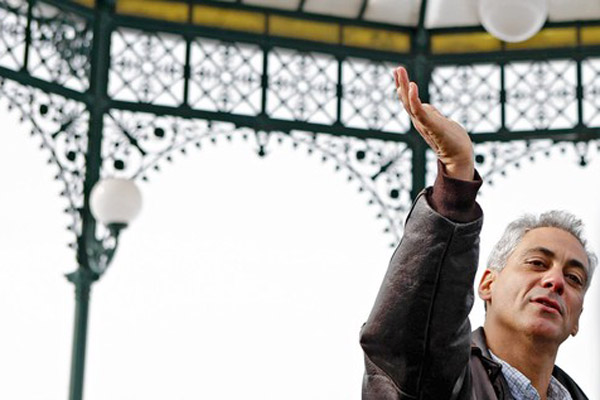
Chicago is set to host both the G-8 and NATO summits next year, a test of Chicago as a world city early in Rahm Emanuel's administration. Some people are predicting a redux of 1968:
[W]ith throngs of reporters in town covering throngs of protesters, we'll have made-for-TV shrieking, and Porta-Potties toppled, and the Chicago police sent forth to preserve order.
The mayor will have sweeping contract powers to take care of this one and that one because he feels like it, with little if any legislative oversight. And that befits a political system where "democracy" is largely symbolic, as it was in Albania for most of the last century.
And some, a great revenue source:
Upon learning Chicago had landed the big event, an executive with the local tourism council predicted the world attention would make the city more attractive to tourists, while the head of the city's convention bureau said it would be "a tremendous shot in the arm for the Chicago convention industry."
Phil Rosenthal describes the contrast between the Democratic conventions of 1968 and 1997, the former an embarrassment to the first Mayor Daley, the latter redemptive normalcy for the second. My guess would be that nothing along the lines of the 1968 riot or the Days of Rage will happen: cities have become much more agile at handing mass protests, and the late 1960s were a very unique time. Things are a bit more tense in 2011 than in 1997, but even with the Protester being the Person of the Year, riots were endemic in America during the tremendous social tensions of the '60s and we haven't really seen anything like it since.
But the Emanuel administration is ahead of the game, as if they looked at a mess of tourists, a mess of protesters, and decided: why can't they both be revenue streams?
Protesters found guilty of resisting a police officer or aiding escape would have to pay a maximum fine ranging from $200 to $1,000. Currently, the range is $25 to $500.
[snip]
The proposal also would appear to give the mayor greater power to sign contracts related to planning security and logistics without City Council approval.
A companion measure also introduced by the mayor would limit the hours of approved parades that have amplified music or sound. They would be allowed between 8 a.m. and 10 p.m.
Edward McClelland calls this "Rahm Emanuel Vs. the First Amendment":
Emanuel’s requests — which include restricting access to parks and beaches, raising fines for resisting a police officer to $2,000 [sic], and allowing him to sign security contracts without City Council approval — have nothing to do with ensuring public safety during demonstrations against the G-8. They are intended to quash those demonstrations before they even begin, by intimidating protestors who can’t afford a $2,000 [sic] fine.
That's an awful cynical way of looking at it. I see it as more like the red-light cameras and "congestion" fees: using very public fee and fine hikes to cut back on the excess of something the government doesn't want… and making big bucks on the inevitability of it occuring in the first place.
Besides, the $500 maximum fine has stayed the same since 1968, when it was raised in advance of the Democratic convention and applied to "cover passive as well as active resistance" (it passed 37-3; Leon Despres, as you might have guessed, objected). In 2011 dollars, that's $3,250. Indexed for inflation, $1,000 is practically a bargain! At those prices you'd be crazy to not protest against international oligarchy.
And that's how we pay for stuff now in Chicago. It's a classically technocratic approach to governance. To paraphrase Richard J. Daley, fines exist to preserve order, and profit from disorder. Then again, it didn't really work when he tried it, either.
Photograph: Chicago Tribune



